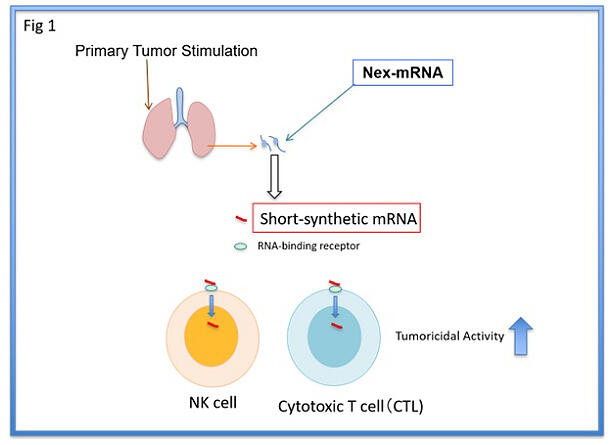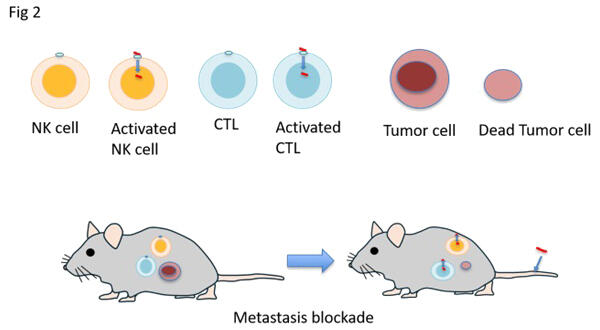A research group led by Professor Sachie Hiratsuka of the Institute for Biomedical Sciences, Interdisciplinary Cluster for Cutting Edge Research at Shinshu University and Professor Yoshihito Ueno of the Faculty of Applied Biological Sciences at Gifu University has successfully demonstrated the inhibition of cancer cell metastasis in mouse models by administering artificially synthesized short, modified mRNA. They also confirmed that anti-metastatic cells from cancer patients could be activated with synthetic modified mRNA to suppress human cancer cell metastasis. The results are expected to be applied to the prevention of cancer metastasis and early-stage treatment. The group's findings were published in the international scientific journal Nature Communications on February 25.

Immune cells (NK and cytotoxic T cells) are activated by short-synthetic mRNA which binds to the ZC3H12D receptor and is transported to the nucleus where it induces the expression of GZMB, a key molecule for tumor-killing activity.
Provided by Professor Sachie Hiratsuka, Shinshu University School of Medicine
More than 90% of cancer deaths are caused by metastasis, and cancer metastasis is now known to occur due to factors in both the cancer cells themselves and the environment of the organs to which they metastasize. In metastatic target organs, there exist anti-metastatic immune cells that, although few in number, play a role in suppressing cancer metastasis. These cells express receptor proteins for mRNA on their cell surface. When specific sequences of extracellular mRNA not enclosed in vesicles bind to these receptors, the cells become activated.
The research group had previously discovered that mRNA with specific sequences existing in the extracellular space could enhance cancer metastasis suppression ability by binding to receptors on the surface of immune cells. While mRNA typically serves as a template for protein synthesis based on cellular genetic information, in this case, it exhibits a completely different physiological function by acting as an information transmitter between cells. However, since mRNA is quickly degraded in the bloodstream, its use as a therapeutic agent had been difficult.

Immunodeficient mouse holding human tumor cells and human immune cells demonstrates tumor metastasis in the lungs. Such tumor metastasis is prevented by short synthetic mRNA injections, as they activate immune cells to kill tumor cells.
Provided by Professor Sachie Hiratsuka, Shinshu University School of Medicine
In this study, the research group synthesized a 50-base RNA (s-mRNA) with special sequences and chemical modifications for stabilization. It was designed based on extracellular mRNA found in the lung tissue of tumor-bearing mice (mice with primary tumors transplanted subcutaneously or elsewhere). NK cells and cytotoxic T lymphocytes express mRNA receptors. This RNA has the same immune cell (NK cells and cytotoxic T lymphocytes) activation ability as natural mRNA while being resistant to degradation by RNA-degrading enzymes in the blood. When it was administered to mice, they confirmed that it could suppress lung metastasis of cancer cells. They also found that multiple administrations did not cause side effects such as cytokine storms or immune cell exhaustion, and the effect was sustained. In experiments where NK cells and CTL cells isolated from colorectal cancer patients were transplanted along with cancer cell lines into immunodeficient mice, they confirmed that administration of the same s-mRNA could suppress lung metastasis.
Hiratsuka commented: "Anti-metastatic drugs have the potential to fundamentally cure cancer. Many researchers, including those at the International Society of Cancer Metastasis, have been working on this, but there has been a tendency to develop anti-metastatic drugs using medications targeting primary cancer cells. Cancer metastasis is completely different from the primary cancer environment, with significant influence from the metastatic target organ, necessitating drugs specifically designed for metastasis. This anti-metastatic drug is metastasis-specific, can be administered simply and safely, and is expected to be effective. We will continue development so that it can be used for cancer patients in the near future."
Journal Information
Publication: Nature Communications
Title: Synthetic short mRNA prevents metastasis via innate-adaptive immunity
DOI: 10.1038/s41467-025-57123-y
This article has been translated by JST with permission from The Science News Ltd. (https://sci-news.co.jp/). Unauthorized reproduction of the article and photographs is prohibited.




